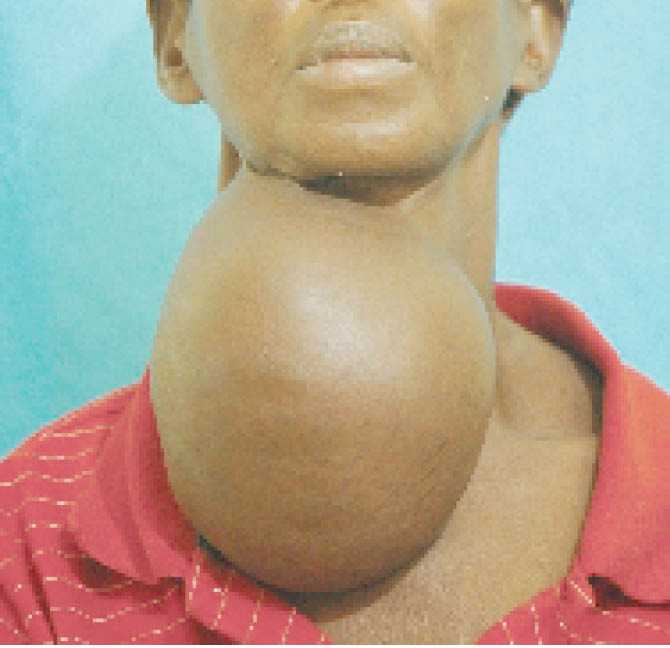Amina suffers from goiter. She said living with the condition involves managing fluctuating symptoms and adjusting daily routines.
She said experiencing symptoms like fatigue, weight loss, hair loss, and mood swings can be challenging and affect one’s quality of life.
“I feel frustrated most times due to the complexity of the condition and the time it can take to find the right treatment balance.”Regular blood tests to monitor hormone levels are part of my routine, and it can be emotionally draining to experience symptoms despite treatment.
“Medication management is critical, often requiring lifelong hormone replacement or treatments to stabilize thyroid function.
- Tinubu trying, he inherited near-bankrupt nation – Tafawa-Balewa
- Bauchi: Senator Buba donates to flood victims, asks gov to act
“Lifestyle adjustments, such as changes in diet, exercise, and stress management, are often necessary. I also rely on my doctors for education and support to better understand my condition and treatment,” she stated.
According to Dr. Muhammad Agashi Haruna, a house officer at the Federal Medical Centre in Jabi, goitre is a medical condition characterised by an enlargement of the thyroid gland, which is located in the anterior part of the neck.
He described a thyroid gland as an organ that plays a key role in regulating the body’s metabolism, adding its enlargement can be a sign of underlying thyroid disorders.
He said factors that could lead to goitre, include:
Iodine Deficiency
This is a common cause, particularly in regions where dietary iodine is low.
Autoimmune diseases such as Hashimoto’s thyroiditis, where the immune system attacks the thyroid, can result in goiter.
Also excess iodine Intake known as the Wolff-Chaikoff effect, excessive iodine can paradoxically cause thyroid enlargement.
Goitrogens
Certain foods, such as cabbage and broccoli, contain substances that can interfere with thyroid function and contribute to goitre.
Radiation Exposure
Previous exposure to radiation, especially to the neck, can increase the risk of goiter.
Genetic Predisposition
A family history of thyroid disorders can increase the likelihood of developing goitre.
Dr Haruna explained that goitre could have different symptoms depending on whether it is associated with hyperthyroidism (overactive thyroid) or hypothyroidism (under active thyroid).
Hyperthyroidism: common symptoms include weight loss, diarrhea, palpitations, excessive sweating, flushed skin, and heat intolerance.
Hypothyroidism symptoms include weight gain, constipation, cold intolerance, dry skin, and fatigue.
The doctor said that physical examination may reveal anterior neck swelling, and additional symptoms may be present depending on the type of thyroid disorder.
Dr. Haruna also emphasised the importance of laboratory and imaging tests to diagnose goitre.
Thyroid Function Tests (TFTs)
These include measurements of Thyroid Stimulating Hormone (TSH), free T3, and free T4 levels to assess thyroid function.
Low TSH suggests hyperthyroidism, while high TSH indicates hypothyroidism.
Thyroid Antibody Tests
These help diagnose autoimmune thyroid conditions.
Imaging Studies Ultrasound, MRI, or CT scans can evaluate the size, structure, and function of the thyroid gland, aiding in determining the cause of goiter.
“Treatment depends on the underlying cause and the size of the goiter. Treatments include medical management, hyperthyroidism patients may be treated with medications such as carbimazole to reduce thyroid hormone production and propranolol to manage symptoms like tachycardia, Dr Haruna said.
He said hypothyroidism synthetic thyroid hormone, levothyroxine, is used to replace deficient thyroid hormones.
Surgical Intervention surgery may also be necessary for large goiters causing compression symptoms or for cosmetic reasons. Procedures like partial or total thyroidectomy may be performed.
“Lifestyle Modifications Regular monitoring, adherence to prescribed medication, a balanced diet, and avoiding smoking are crucial in managing goiter,” he added.
To reduce the risk of goiter, Dr. Haruna recommends:
-Dietary measures, he said it is good to consume iodine-rich foods such as seafood, dairy products, and eggs, while avoiding excessive iodine intake.
-Avoiding goitrogens limits foods like cabbage and broccoli if you are at risk for thyroid problems.
-Annual thyroid checkups are very important especially for those with a family history of thyroid disorders.
-Minimise radiation exposure and take precautions to avoid unnecessary radiation to the neck region.
He said with proper diagnosis, treatment, and lifestyle adjustments, goiter can be effectively managed, and complications can be minimised.
He also dispelled some common myths surrounding goiter such as visible swelling.
“Many believe that goiter must always be visible. However, small goiters may not cause any noticeable swelling or symptoms.
“While iodine deficiency is a major cause, goiter can also occur in individuals with adequate iodine intake due to autoimmune diseases’ he said.
Dr Haruna further said that not all goiters are harmful. Some may be benign and asymptomatic, while others may indicate thyroid dysfunction or malignancy.
‘Last but not the least goiter is a complex condition with various causes and manifestations. By understanding its symptoms, risk factors, and treatment options, individuals can take steps to maintain thyroid health and seek timely medical intervention when necessary’ he advised.

 Join Daily Trust WhatsApp Community For Quick Access To News and Happenings Around You.
Join Daily Trust WhatsApp Community For Quick Access To News and Happenings Around You.
